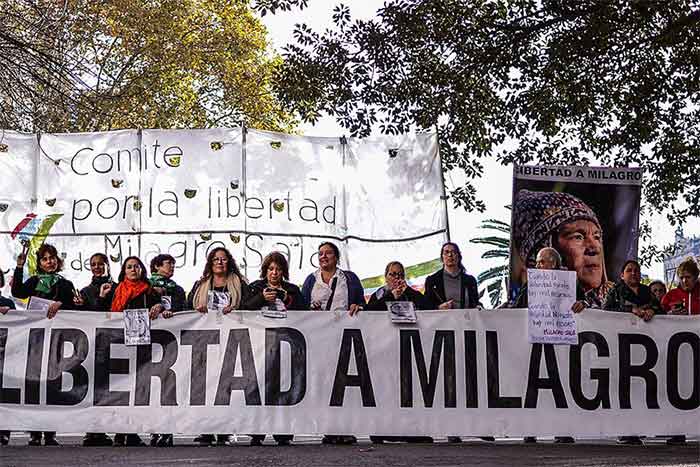
To protest rightist policies of far-right president, Argentinians have begun a general strike on Wednesday. The General Confederation of Labor (CGT) called on Argentinians to mobilize nationwide to protest against the far-right President Javier Milei.
From 8:00 am, members of the Truck Drivers’ Union have been stationed on Mayo Avenue and around the Congress, making their voices heard with drums and horns.
This strike is the first general mobilization since 2019. This strike has the support of hundreds of social organizations, and takes place 45 days after Milei assumed the presidency. Argentinians residing abroad announced that they will join the protests.
A teleSUR report said:
Javier Milei’s policy intentions are summarized in the “Omnibus Law,” a bill aimed at reducing the provision of public services and goods, deregulating the domestic economy, privatizing the national heritage, and eliminating labor rights.
Starting at noon, people have started gathering in downtown Buenos Aires where various social leaders will deliver public speeches. Security Minister Patricia Bullrich warned that her forces would deploy an anti-protest protocol.
Court Orders: No Filming Of People
To ensure respect for civil rights, Federal Judge Ernesto Kreplack urged authorities to refrain from issuing orders to security forces that involve “filming and/or intercepting people in public spaces for the purpose of identifying and/or searching them without prior judicial order.”
Argentina Is Not For Sale
Protests were held in France And Belgium.
“A demonstration of support for the Argentine people. NO to the ‘Urgent Necessity Decree’. NO to the Omnibus Law. Argentina is not for sale!” reads a poster hung in Toulouse, France.
“For democracy and the implementation of social and human rights. NO to the dismantling of the Argentine state. The country is not for sale!” expressed Argentinians who called for a rally at the Mint Square in Brussels, Belgium.
Argentinians residing in Germany are also preparing a “pot banging” event in Galandrellianlage Park, near the Argentine embassy in Berlin, starting at 3:00 pm local time.
Mass Protests Against Milei’s ‘Shock Therapy’
Another media report said:
Argentina’s labor unions have called for a mass strike on Wednesday to protest the economic reforms introduced by President Javier Milei.
Labor unions representing workers in various industries, including transportation, construction, and the public sector, are set to march in Buenos Aires.
“There will be at least 200,000 marching [in Buenos Aires] and I believe the strike will be total,” Gerardo Martinez, leader of Argentina’s Construction Workers Union, told the Financial Times ahead of the protest. He believes that the government is “breaking the social contract” with its new reforms and that the strike might convince lawmakers to block the measures and start negotiating alternative ways to support the economy.
“We did not choose this path, but unfortunately they gave us no alternative… We are aware that inflation [needs to come down.] We are embarrassed to have a country with this level of poverty. But we cannot accept that the cost of reaching economic stability falls solely on the backs of workers and the middle class,” he stated.
Some 300 “Shock Therapy” Measures
Shortly after Milei took office in December, his government unveiled a series of some 300 “shock therapy” measures aiming at overhauling the country’s economy and reining in public spending. The reforms slashed worker protections, deregulated industries and cut energy and transportation subsidies, among other things. The austerity program is aimed at lifting the country out of a severe economic crisis during which annual inflation has surpassed 200% and more than 40% of Argentinians are now living in poverty.
Despite the harsh criticism and protests, Milei has so far stood by his new policies, warning that it will take time for results to be seen. He criticized the organizers of the strike earlier this week, accusing them of trying to keep the country “in backwardness, in the past and in decadence,” while he wants to adopt a model that will place Argentina on “the path to being developed,” as cited by state news agency Telam.
‘Shock Therapy’
The sweeping economic measures known as ‘Shock Therapy’ include the privatization of state-owned companies, as well as steps to end limits on exports and loosen price controls.
The newly elected far-right president, who describes himself as an anarcho-capitalist, recently signed a decree setting out over 300 measures as part of his “economic shock therapy.”
“I’m signing an urgent decree that will kick-start the process of economic deregulation that Argentina needs so much,” Milei said in a televised address in December 2023.
Milei has set out a list of initial policy changes, which include a “modernization of labor law to facilitate the process of creating real jobs” and a series of other deregulatory measures affecting tourism, satellite internet services, pharmaceuticals, wine production, and foreign trade.
His plan comes one week after Argentina’s new government announced a 54% devaluation of the peso, cuts to energy and transportation subsidies, and a freeze in spending on some major state programs.
There are also plans to hike taxes for Argentina’s grains exports – a key source of global supply for processed soybeans, corn, and wheat.
The initiative was met with harsh criticism from agriculture groups who warned that the measure would harm the industry. Grain exports are a major source of foreign currency reserves for the country’s central bank and are needed to finance imports and repay debts.
The changes have already proved divisive as thousands of people recently took to the streets of Buenos Aires to voice their discontent over the government’s austerity plans and to demand more support for the poor.
Latin America’s third-biggest economy is challenged by a severe economic crisis after decades of debt and financial mismanagement, with annual inflation surpassing 160% and 40% of Argentinians living in poverty.
The devaluation changes the official dollar exchange rate to 800 pesos per dollar from 365 pesos.
State support of the peso has been maintained by strict capital controls during the past half-decade, which created a wide gap between the official exchange rate of the dollar and parallel rates.
The new Economy Minister of Argentina Luis Caputo divulged in a televised message that the measures are aimed at tackling spiraling inflation and containing the worst economic crisis in decades.
According to Caputo, the plan will be painful in the short term but is vital for cutting the fiscal deficit and bringing down the triple-digit inflation the country is currently struggling with.
The South American nation is currently struggling with a rampant inflation of 150%, low cash reserves and high government debt, while some 40% of its population is forced to live in poverty. Argentina has a massive $44-billion debt to the International Monetary Fund.
The IMF said in a statement that the measures were “bold,” adding that implementing them would “help stabilize the economy and set the basis for more sustainable and private-sector led growth” following “serious policy setbacks” in recent months.
“I welcome the decisive measures,” IMF chief Kristalina Georgieva said, calling it “an important step toward restoring stability and rebuilding the country’s economic potential.”
‘No More Barbecues’ For Argentinians
A Reuters report this week said:
Argentina’s traditional asado barbecue is no longer affordable for many households due to soaring meat and vegetable prices.
The word ‘asado’, which is derived from the Spanish word for ‘roasted’, refers both to the unique grilling method for Argentinian barbecue and also to the vibrant social gathering among friends that traditionally accompanies the meal.
However, with inflation in the country having topped 200% last year, more Argentinians have been further tightening their belts.
“We have had to eliminate things that made life a little brighter,” Argentine retiree Susana Barrio told Reuters. “That joy it gave me to invite my friends for a barbecue, which is typical here, now that is impossible,” the 79-year-old lamented.
Decades Of Debt And Financial Mismanagement
Latin America’s third-biggest economy is bearing the brunt of a severe economic crisis after decades of debt and financial mismanagement. An estimated 40% of Argentinians are living in poverty.
According to official statistics, inflation rate hit 25.5% month-on-month in December. It is expected to climb faster in the months ahead after President Milei’s government devalued the peso by over 50% last month as part of his so-called ‘shock therapy’ reforms to stabilize the ailing economy.
“You totally lose track of prices,” said Guillermo Cabral, a 60-year-old owner of a butcher shop in Buenos Aires. Cabral told the outlet he had once mistakenly told a customer the price for a particular meat was 35,000 pesos ($43) instead of 15,000 pesos. “The customer took out the money to pay it all the same,” he said.
Count Potatoes
A 65-year-old retiree, Graciela Bravo, told Reuters she had started carefully counting how many potatoes she buys. “Before you would purchase by the kilo, now I get three potatoes or four potatoes so they do not spoil,” she recounted.
A self-described anarcho-capitalist, Milei, who has been in office for a month, has warned it will take time for the results of his program to be seen and that things could get worse before they get better.
Judges Suspend Milei’s Labor Reform
A media report said in early-January:
The National Appeals Chamber of Labor of Argentina temporarily suspended the labor reform included in the decree of necessity and urgency (DNU) signed by Argentine President Milei on December 20.
Judges Andrea Garcia Vior and Alejandro Sudera issued a precautionary measure requested by the General Confederation of Labor (CGT) which nullifies the changes in labor matters that had come into effect on December 29.
Last week, the CGT carried out a mobilization against the DNU and asked the Judiciary to halt the labor changes that Milei wanted to impose by decree. The La Rioja Governor Ricardo Quintela also asked the Supreme Court to declare his decree unconstitutional.
“The judicial resolution puts a stop to a regressive labor reform… They will not defeat us as long as we remain united,” CGT posted.
To counter this setback, the Milei Government plans to appeal the decision of the Labor Chamber to suspend the labor chapter of the decree of necessity and urgency.
“The Attorney General will appeal the precautionary measure of the Labor Chamber that suspends the DNU labor chapter and will request the incompetence of that jurisdiction,” the Presidency stated, arguing that the Labor Chamber’s resolution “contradicts all the rulings issued so far in the country” on the matter.
The Milei administration maintains that the Labor Chamber’s decision ignores the criterion adopted by other courts that sent the case to a “natural and universal judge” with the powers to address any matter related to federal administrative litigation.
In fact, the decision of the labor tribunal was not unanimous, as Judge Dora Gonzalez proposed sending the case to the Administrative Litigation Chamber to determine which jurisdiction should handle the case.
Milei’s proposed reform includes changes in labor lawsuits, the extension of probation periods in companies, the reduction of pregnancy leave, a decrease in pension contributions, a reduction in worker compensation, and a reduction in fines for companies with deficient worker registries.
January 15 Was A Day of Struggle
Earlier, the Association of State Workers (ATE) resolved to call for a “day of struggle and mobilization” on January 15th, following waves of dismissals announced by the administration of President Milei.
“It is the good Argentine men and women who are being left without jobs by the decision of the goverment, which should guarantee social peace. With these layoffs, it is doing nothing in that regard,” denounced Rodolfo Aguiar, the ATE secretary.
“The Milei administration’s insensitivity is absolute. They are leaving thousands of families on the streets. They are business people who have no idea about the real needs of the people,” he said early in the morning to accommodate an urgent session of the union.
The alert was triggered on December 26 when Decree 84/2023 was published in the Official Gazette, announcing the dismissal of “all workers who entered after January 1, 2023,” with the exception of those falling under the quota for disability and transgender individuals.
“We are being governed by businesswomen and businessmen who may not know the rules governing public administration… The Milei administration claims that contracts are not being renewed, but the truth is that these are covert layoffs,” Aguiar said.
“These are unjustified dismissals because these are workers performing essential tasks to ensure the functioning of the State,” he pointed out, recalling that conservatives seek to discredit public employees in order to implement their policies without social resistance.
On Tuesday, the ATE’s National Center of Retirees also met to vote and define a day of protest on January 10th to demand action against all measures affecting their retirement benefits and to reject any attempt to privatize the pension system.














































